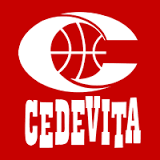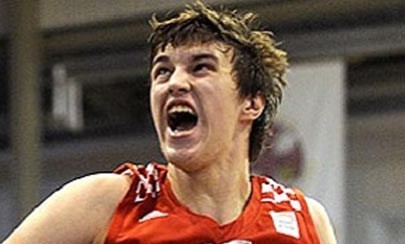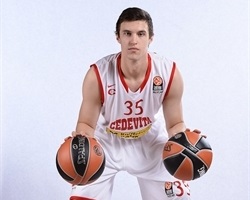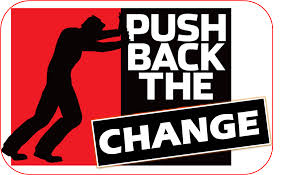 I am going to tell you about a rising new star you probably haven’t heard of: Marko Arapovic of Cedevita Zagreb, which has advanced to the Final 16.
I am going to tell you about a rising new star you probably haven’t heard of: Marko Arapovic of Cedevita Zagreb, which has advanced to the Final 16.
But first, a few words on some familiar names who could be missing out.
Maccabi Tel Aviv won its sixth European Basketball title in 2014 (under David Blatt, you may remember.) Then last year, Real Madrid shook off a 21-year drought to win their ninth title, the most of any team in Europe.

 With losses next week, both teams could be eliminated from the competition before the Top 16 even begins.
With losses next week, both teams could be eliminated from the competition before the Top 16 even begins.
After a big, 19-point win at Munich this week landed them all the tiebreaks they needed, the Madrileños still need to take down 3-6 Strasbourg at home to eke out a Top 16 berth.
Maccabi’s road is more difficult, as they travel to Istanbul to face Darussafaka Dogus, who beat them by 11 in their first meeting. That means the Israelis must win by 12 to earn their tiebreaker, no small task against a Darussafaka team that only allows its opponents 74.4 points per game.
Meanwhile, Euroleague rookie Cedevita Zagreb clinched a spot this week with a loss against Milano—yes, with a loss—and did it thanks to a career performance by a 19-year-old.
How Cedevita did it, plus why Madrid and Maccabi have never faced such pressure to advance, in this week’s Euroleague wrap-up.
Cedevita Advances, Arapovic Rises
 Cedevita Zagreb lost by three to Milano this week to advance to the Top 16, and Milano is thus eliminated.
Cedevita Zagreb lost by three to Milano this week to advance to the Top 16, and Milano is thus eliminated.
Yep. The Euroleague is funky like that.
After trailing 45-31 at the half, Cedevita fought back with a 26-point third quarter and a 25-point fourth to lose by three. The loss put Cedevita at 4-5 for the season, one win better than Milano’s 3-6. So while a Cedevita loss and a Milano win next week would put their records squarely at 4-6, the three-point Cedevita loss ensured that the Croatians would have the tiebreaker they needed to advance for the first time in the club’s history.
It’s strange to see a team mobbing each other on the court after a three-point loss, but that’s one of those little quirks that lends the Euroleague its charm. It keeps teams from mailing it in late in games, since every point matters. It means you’ll see coaches calling timeouts and drawing up plays with their teams down or up 7 points and 10 seconds remaining. It means that 40 minute games are actually 40 minute games. A novel concept, indeed.
 The man primarily responsible for this second half surge was Marko Arapovic, a 1996-born Croatian power forward who had his best game ever as a pro when his squad needed it most.
The man primarily responsible for this second half surge was Marko Arapovic, a 1996-born Croatian power forward who had his best game ever as a pro when his squad needed it most.
Arapovic squeezed 16 points, 7 boards, an assist and two steals into 28 minutes, and hit three huge triples in four attempts to help Cedevita close the gap on their Italian counterparts. He displayed the versatility, poise and BBIQ that makes him one of my favorite draft prospects. He plays more like he’s 29 than 19.
He reads the floor well, showing an advanced understanding of spacing and the importance of ball movement in Cedevita’s offense which churns out one off-ball screen after another on the wings and in the corners. He shoots it decisively and has hit 10-26 (38.5%) from three in the Euroleague this season. He has 9 assists to only 8 turnovers this year in nine games, limiting mistakes against the likes of Anadolu Efes, Milano, Laboral Kutxa and the Euroleague’s best defensive side, Olympiacos. He showed yesterday that if you close out hard on him, he can pump it, bounce it and find an open look from the elbow and/or draw a second defender and dump it off.
I loved this guy when I saw him two summers ago in Konya, Turkey for the FIBA U18 European Championships; his no-look outlet passes after carving out space for a board, his stroke from 15 feet out to the arc, his patience with the ball in his hands and the way it brought him joy to make plays for his teammates.
He’s listed anywhere between 6’8” and 6’11” depending on which site you trust, and in all reality is somewhere in the middle. He’s not ripped but he’s not chubby, probably somewhere in the middle. He’s not a total non-athlete, but he’s not explosive either. Probably somewhere in the middle. His arms aren’t short, but they’re not long, either. Probably somewhere in…yeah. The middle again.
 These guys have a tendency to slip through the NBA’s cracks. They do not jump off the charts athletically or physically, and if a team’s international scout sends his GM to Zagreb watch a Cedevita game where Marko grabs two rebounds and shoots 2-6 from the field, that GM will likely leave uninspired. But anyone who dedicates time and energy to The Marko Arapovic Study will come away impressed with his maturity and his offensive skill level.
These guys have a tendency to slip through the NBA’s cracks. They do not jump off the charts athletically or physically, and if a team’s international scout sends his GM to Zagreb watch a Cedevita game where Marko grabs two rebounds and shoots 2-6 from the field, that GM will likely leave uninspired. But anyone who dedicates time and energy to The Marko Arapovic Study will come away impressed with his maturity and his offensive skill level.
Jonathan Givony over at DraftExpress, who does a terrific job with the international guys, has Arapovic slated as the 21st pick in the 2017 draft. And given Marko’s resume so far, that sounds about right.
If I’m back in an NBA front office, however, I’m tugging on my GM’s sleeve trying to sneak him into this year’s draft so I can take him with my second-round pick and let him mature for two, possibly three more years playing in the Euroleague and for the Croatian National Team. Then, once it makes sense both for my finances and my team (ie: Marko’s buyout + my team’s cap number + the bigs I currently employ) I bring over a really good basketball player who should have no problems fitting in offensively, and who I believe is smart enough to play solid team defense despite physical stats that are below average for NBA standards.
Bid Adieu to the Regular Season as We Know It
Since the inception of the ‘modern Euroleague’ in 2000, the Euroleague has always tweaked its model. For instance, two years ago they moved from a 6-game Top 16 to a 14-game version. The response was mixed at the time, as it diluted the league’s most critical stage but at the same time, we got more high-quality Euroleague basketball, which I deemed a good thing and still do.
Next year, however, things are about to change more drastically than they ever have.
The Euroleague recently penned a 10-year deal with IMG that will turn the 24-team competition into a 16-team competition starting with the 2016-17 season. The system will make it more difficult for new teams to emerge as participants, since 11 of the 16 clubs will be locked in permanently with A Licenses: Anadolu Efes and Fenerbahce from Turkey; FC Barcelona, Real Madrid and Laboral Kutxa from Spain; Olympiacos and Panathinaikos from Greece; CSKA Moscow of Russia; Milano from Italy; Zalgiris from Lithuania; and Maccabi from Israel.
The Eurocup winner will take the 12th spot, and an eight-team qualifying tournament at the start of the season will determine the thirteenth. That leaves a mere three spots for domestic league champions to butt in and compete in the continent’s top league.
These 16 teams will compete in a round-robin format during a 30-game regular season, three times longer than the current 10-game regular season format.
 Moving toward a ‘closed competition’ style is not very European, and predictably mimics the NBA’s model.
Moving toward a ‘closed competition’ style is not very European, and predictably mimics the NBA’s model.
This jolting change by the Euroleague came as a response to FIBA’s attempts to pry the Euroleague’s top clubs away and start its own league, the ‘Basketball Champions League,’ a transparent nod to European football’s Champions League.
The Euroleague’s deal with IMG effectively delivers a splintered stake through the heart of FIBA’s mutinous endeavor.
Some pros to this format: regularity, less chaotic, less complexity, more stability for Euroleague teams.
Some cons to this format: regularity, less chaotic, less complexity, less hope for domestic league teams to realize their dreams of becoming a Euroleague participant, even for one fleeting season.
We’ll need to see how this plays out to understand the challenges and unintended consequences the New Euroleague will bring, but this much is certain as we enter the regular-season’s final week: this will be the last time an incredibly meaningful Euroleague game is played in December; it will be the last time an upstart team like Cedevita can deliver a knockout blow to a powerhouse like Milano and advance out of nowhere; it will be the last time A-Licensed, perennial contenders like Madrid and Maccabi will face elimination before the New Year.
If you’ve wanted a closed model for years, then put down your pom poms long enough to appreciate the pressure-packed final chapter of an era. If you think this deal will ruin European basketball as we know it, then wipe away the tears and brush off the bitterness long enough to watch what you’ve loved disappear into the sunset.
Whether you’re a fan of the new deal is immaterial. European basketball fans, more so than fans of any other sport, have become accustomed to resisting, accepting and then embracing change. But first, let’s bid a proper farewell to one of the wacky traditions that made me—and so, so many—fall in love with this wonderful, weird and at times dysfunctional world we call the Euroleague.
Here’s to the next adventure.
MORE FROM NICK GIBSON:
Dario Saric Update, Plus Other Euroleague News
NBA-Level Talent Leading Euroleague’s Undefeated Teams
Jan Vesely Reinventing Himself as a Center in Turkey
Nick Gibson covers international basketball for Sheridan Hoops. He spent the last two seasons working in the Atlanta Hawks front office scouting international players and is the editor of Euroleague Adventures.